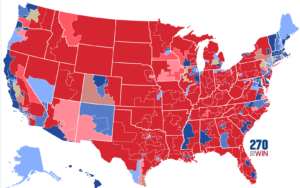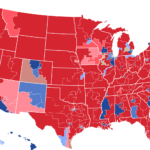If you watch any amount of television or own a smartphone, it’s no secret the United States’ current presidential administration is a daily fiasco. News sources constantly commentate on President Trump’s every move, countless indictments, resignations due to the Mueller probe, and you can’t mention U.S. Politics without mentioning the president’s tweets. But no recent event is shaking up the country and causing the whole world to observe in disbelief as much as “the wall.”
Yes, the U.S. is not an outlier for proposing a border wall. Currently, over 77 countries have a border wall, and this concept has been around since ancient times. However, I find the Trump administration’s reasoning for needing the wall is a fallacy.
The walls surrounding other countries, like the Great Wall of China, are proven, measures of protection against groups that have historically ravaged their native people in ancient times.
Nonetheless, Mexicans and other Latin Americans, who are the victims of this potential wall at the southern border, have no legitimate history of ravaging the American people. It is feasible to affirm the U.S. does not have this alibi.
With “protection” out of the picture, what is the real reason the Trump administration is pushing for the wall? Is it a conflict of interest? Does the president just want to have his way? Or is it truly an agenda to promote mass fear and abhorrence for our brethren known as immigrants or refugees?
This fear, unfortunately, is already faring a sharp price. Due to the administration’s lack of funding for the wall, the United States has experienced the longest shut down in its history.
Throughout the 35-day period, over 800,000 federal employees received no paycheck, national parks were closed, and vital entities, such as the Food and Drug Administration (FDA), were unable to inspect the quality of everyday aspects of American life.
Trump’s fight to have this wall built is directly impacting aspects of everyday life for Americans and his approval ratings.
Airport Security
Affected by the government shutdown, TSA agents have taken “unscheduled absences” at historic records and other government employees have become disengaged from their duties. Consequently, flights were delayed and terminals were closed in LaGuardia Airport, citing staffing shortage. Simply put, airport security and safety has undoubtedly become compromised.
Not to mention, some federal workers could not even afford to put gas in their cars to drive to work.
Tax Payers’ Finances
Since Mexico is not going to pay for the wall, and rightfully so, who’s left to the fund the $5 billion project? Since the executive office and Congress are on conflicting ends of the spectrum, the funding will eventually fall in the hands of the taxpayers, particularly the middle class.
Since federal employees are compensated through tax dollars, taxpayers face the burden of providing back pay. Charities, which are operated by taxpayers, also face financial hardship due to the border wall.
Whether we realize it or not, this may cause some people to blame immigrants for their financial woes and conclude the wall is necessary for the administration to protect them.
International Relations
Due to recent events, it’s safe to say the relationship between the United States and neighboring Mexico and Canada, who also happen to be the other members of the North American Free Trade Agreement (NAFTA), is on rocky terrain.
Other countries and allies are watching this unfold. Even though they are not directly, impacted by the border wall, they are viewing the U.S. as a cautionary tale for what happens when you are not an inclusive, society. This can potentially harm future social, political, and economic relations. In turn, this is creating further fear and animosity between U.S. citizens and immigrants.
The Environment and Wildlife
The border wall will cause vast, environmental damage. Construction always mean lost vegetation which will result in less oxygen and the release of greenhouse gas emissions. Countless, species will lose the habitat they called home for centuries and will potentially become endangered. Since nature is a relatively, important topic in recent times, the wall is once again thrusting the idea of fear in America.
Basic Human Rights
This issue often takes a backseat to the more financial aspects of this debate. Unfortunately, the media’s lack of coverage on human rights at the border cannot erase the emotional ruin and sometimes end, of the lives of refugees. We must remember “these people”, who are crossing the border, are human beings escaping their violent and poverty-stricken homes in search of a better life for themselves and their families.
This is not a conscious choice to break the law. As Malala Yousafzai stated on CBS News, “their last choice is to become refugees, but that’s often the only choice to survive.”
Unfortunately, this fact is often lost in the haze of the crisis. The treatment of refugees (particularly young children) at detention camps at the border is even more appalling. Anyone who has experienced abuse in their lives knows that pain can never be fully erased. Pain is the ultimate source of fear.
The border wall can be interpreted in many ways, but there is a moral to this story. No matter how you may feel about the current state of U.S. Politics, the truth is we are one human race. Unity, not barriers, is the only way the world will see true peace.











